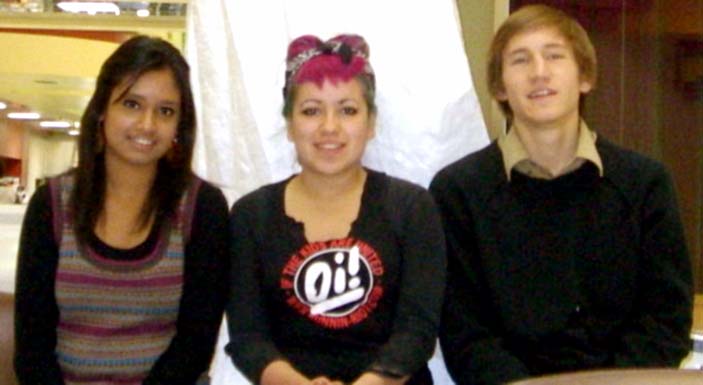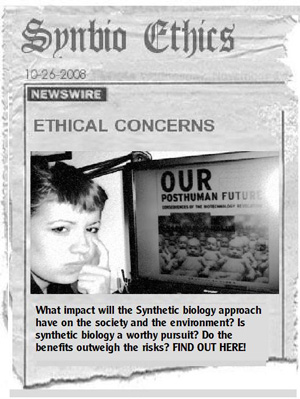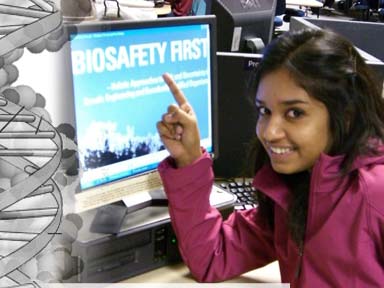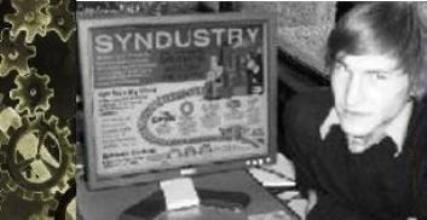Team:Calgary Ethics
From 2008.igem.org
| (252 intermediate revisions not shown) | |||
| Line 1: | Line 1: | ||
| + | <table width="90%" border="0" cellspacing="0" cellpadding="0"> | ||
| - | {| style="color:#1b2c8a;background-color:# | + | <tr> |
| - | !align="center"|[[Team:Calgary_Ethics|Home]] | + | <td>[[Image:Banner3.jpg]]</td> |
| - | !align="center"|[[Team:Calgary_Ethics/Team| | + | </tr> |
| - | !align="center"|[[Team:Calgary_Ethics/ | + | |
| - | !align="center"|[[Team:Calgary_Ethics/ | + | |
| + | |||
| + | </table> | ||
| + | |||
| + | <table width="90%" border="0" cellspacing="0" cellpadding="0"> | ||
| + | |||
| + | <tr valign="top"> | ||
| + | <td valign="top"> | ||
| + | <table width="140px" border="0" cellspacing="10" cellpadding="10" valign="top"> | ||
| + | <tr valign="top"> | ||
| + | <td style="font-size:20px">[https://2008.igem.org/Team:Calgary_Ethics Home]</td> | ||
| + | </tr> | ||
| + | <tr valign="top"> | ||
| + | <td style="font-size:20px">[https://2008.igem.org/Team:Calgary_Ethics/Team Team]</td> | ||
| + | </tr> | ||
| + | <tr valign="top"> | ||
| + | <td style="font-size:20px">[https://2008.igem.org/Team:Calgary_Ethics/Adult_Surveys Adult Survey]</td> | ||
| + | </tr> | ||
| + | <tr valign="top"> | ||
| + | <td style="font-size:20px">[https://2008.igem.org/Team:Calgary_Ethics/High_School_Surveys High School Survey]</td> | ||
| + | </tr> | ||
| + | <tr valign="top"> | ||
| + | <td style="font-size:20px">[https://2008.igem.org/Team:Calgary_Ethics/Collaboration Collaboration]</td> | ||
| + | </tr> | ||
| + | <tr valign="top"> | ||
| + | <td style="font-size:20px">[https://2008.igem.org/Team:Calgary_Ethics/Future_Plans Future Plans]</td> | ||
| + | </tr> | ||
| + | <tr valign="top"> | ||
| + | <td style="font-size:20px">[https://2008.igem.org/Team:Calgary_Ethics/Acknowledgement Acknowledgement]</td> | ||
| + | </tr> | ||
| + | <tr valign="top"> | ||
| + | <td style="font-size:20px">[https://2008.igem.org/Team:Calgary_Ethics/Notebook Notebook]</td> | ||
| + | </tr> | ||
| + | </table> | ||
| + | </td> | ||
| + | |||
| + | <!--This is where the PAGE INFO STARTS --> | ||
| + | |||
| + | |||
| + | <td> | ||
| + | |||
| + | <h2>Welcome to University of Calgary’s 2008 iGEM Ethics Team!</h2> | ||
| + | |||
| + | '''Added after the competition: In order to allow for a dialog between the Calgary iGEM Ethics team and people who visit the Wiki we just added a discussion forum to an external Wiki that can be found at http://igemethics.wikidot.com/''' | ||
| + | |||
| + | Here now the text from the competition | ||
| + | |||
| + | [[Image:Team--photo.jpg|right|thumb|450px|The Team]] | ||
| + | <p>We are the first undergraduate student team presenting a project at the International Genetically Engineered Machine (iGEM) competition that is exclusively focused on investigating the ethical, environmental, economic, legal and social (E3LS) issues attached to synthetic biology. We are very excited and feel fortunate to be allowed to add this facet to iGEM. Two of us began this project at the end of our first year in Health and Society and one of us had just finished second year in biomedical science. </p> | ||
| + | <p>The primary goal of our project this year is to comprehend how much government agencies, industry, NGO’s and academics are aware of synthetic biology and what they envision from and for this new approach to science. These groups are very likely to be dominant groups shaping the synthetic biology discourse in the future. We also wanted to see whether high school students are aware of the topic and what they think of synthetic biology will likely have to deal with the future outcomes of synthetic biology. | ||
| + | <br> | ||
| + | We also looked into what the synthetic biology vision is from our fellow iGEM participants. | ||
| + | </p> | ||
| + | <p>Our goal was to inspire the minds involved in synthetic biology, to navigate through and be aware of the present achievements, future potentials and possible pitfalls that would limit the future potential of synthetic biology and its overall possible implications in our everyday lives.</p><br> | ||
| + | |||
| + | [[Image:News24.jpg | right]] | ||
| + | |||
| + | <h2>Is the world prepared for Synthetic Biology?</h2> | ||
| + | <p>Any iGEM participant could express their idea as to what they think synthetic biology is, the approach that it could take to incorporate an engineering platform to life science, the possible importance and benefits of its current applications (in medicine, fossil fuels, environment and technology), future potential and an example for each of these aspects of synthetic biology. However for us its less clear what the level of understanding and knowledge and views around the ethical, environmental, economic, legal and social (E3LS) issues attached to synthetic biology are from various groups involved or very likely to be involved in synthetic biology. </p> | ||
| + | |||
| + | <p>The main aim that synthetic biology strive to achieve is to make life better by securing resources, increasing production, protecting the environment, making new drugs/medicine, improving technology with a different and new touch than what has been applied before to achieve the same goal. We feel that this aim can only be achieved with a strong embedded ethical, environmental, economic, legal and social (E3LS) analysis of proposed and envisioned projects. </p><br> | ||
| + | |||
| + | <p> We the University of Calgary's iGEM ethics team do not see the evaluation of the ethical, environmental, economic, legal and social (E3LS) issues as a means to devalue synthetic biology work or to question the work from fellow iGEMers and others but we see our work as providing knowledge that should enhance the work of fellow iGEMers and others by adding to a constructive discourse that can only improve the chance of synbio for being seen in a positive light and for the synbio products and processes envisioned to reach their full potential During our work this summer, we collaborated with two wetlab teams of iGEM 2008 to evaluate the practical application and acceptance of their project in the society, and we were not surprised to find how many concerns they had related to ethical issues of biosafety, biosecurity, environmental effect of their engineered organism, how society will take their product, effectiveness, cost and benefits.</p><br> | ||
| + | |||
| + | <p>So one of the main focuses of our project was to understand where the general public stands in terms of their awareness about the current application of synthetic biology, what they think synthetic biology's potential is. Most importantly we strived to find out their expectations of synthetic biology and their fears/concerns with the purpose to convey their message to the synthetic biology practitioner community. Our approach was such that while asking them questions, we tended to encourage them to go out and search for information/literature themselves about current approaches without making any biases.</p> | ||
| + | <p>So are they ready? - The answer is neither yes nor no. We found that many times a "technological manipulation" was being identified both as "scary" and "beneficial" by a single individual at the same time. So where they stand is in a maze of confusion. The literatures in scientific terms is not easy for a non-biologist and a non-engineer to understand and many times it's the fear that "am I getting enough information of possible side-effects, other effect in molecular level in our body or environment?" We need to find an approach to eliminate this gap - either by going and talking to them in a way that's plausible, or listen to their concern in their language and give feedback in the same terms.</p><br> | ||
| + | |||
| + | |||
| + | |||
| + | [[Image:SIBATIGEM.jpg | left ]] | ||
| + | <h2>The Project:</h2> | ||
| + | <p>Our team has written and sent out two online surveys (one written for high school students, another written for adults. We had to go through a process of receiving ethical approval to disseminate our survey online. The purpose of this study was to better understand the level of knowledge the participants have about the emerging field of synthetic biology, what they feel the future of synthetic biology holds, what implications of advances in synthetic biology may be and what the framework of governance for synthetic biology should be. To start somewhere, we sent the link to our survey to 130 different people in the beginning, who were asked to send the link through their networks. We hoped that in this way we would reach a diverse group of people who are linked to government agencies, industries, Universities, NGO's and are from the general public. By doing so, we have received a broad spectrum of responses rich in diversity and perspectives. We also sent out a link specific for iGEM participants hoping that we can showcase what the thoughts of iGEM participants are.</p> | ||
| + | <p>Our survey analysis compares to some extent the differences of answers of synthetic biology practitioners (iGEM participants) and that of the general public. Through that analysis we highlighted significant difference in responses of synthetic biology's governance policy and biosafety concerns.</p> | ||
| + | <p>The survey for high-school participants takes in account of their level of knowledge and background in biology, technology, ethics and society. The high school survey contains more examples of current products and applications of synthetic biology at present. However, in doing so, we put much attention in making sure that the examples do not bias the understanding and thus the answers to our survey.</p> | ||
| + | |||
| + | <h2>Presentations:</h2> | ||
| + | <p>As an extension to our survey, our team also met with the group of high school students after they took our survey to provide answers to any further questions they had regarding our project, survey or the synthetic biology field itself. We also had a PowerPoint presentation that gave them a thorough overview of the field and encouraged a debate on its implications.([[media:High_school_presentation.pdf]])</p><br> | ||
| + | |||
| + | <h2>Collaboration:</h2> | ||
| + | <p>Collaboration with the Guelph iGEM team 2008. We provide E3LS feedback to the Wetlab team from Guelph.[https://2008.igem.org/Team:Calgary_Wetware Calgary Wetware Team]</p> | ||
| + | <p>Collaboration with the Calgary Wetlab iGEM team 2008 We provided also E3LS feedback to the wetlab team from Calgary.[https://2008.igem.org/Team:Guelph Guelph Team]</p> | ||
| + | <p>Collaboration with Laura Dress, a presenter at Synbio 4.0 where we provided feedback on synbio regulation ideas. | ||
| + | [[:Image:Complete-lauradress.jpg|Click here to see her poster]] | ||
| + | </p><br> | ||
| + | |||
| + | [[Image:Syndustry-2.jpg | left ]]<h2>Online Course in Synthetic Biology: </h2> | ||
| + | <p> | ||
| + | As another part of our project we developed a 13 week three credit online course on the E3LS issues of Synthetic Biology. We selected a big reading list so that course could be taught on the undergraduate and graduate level. By no means is this list complete and it will likely have to be updated on a yearly basis.<br> | ||
| + | <br>Click on this link to find out more about the course ([[media:Synbio_course.pdf]]).</p> | ||
| + | |||
| + | <h2> Questions? Feedback?</h2> | ||
| + | <p>If you have any questions about our project or if you want to offer feedback, you can email us at: | ||
| + | igemcalgaryethics@gmail.com</p> | ||
| + | |||
| + | </td> | ||
| + | |||
| + | </tr> | ||
| + | |||
| + | </table> | ||
| + | |||
| + | |||
| + | |||
| + | {| style="color:#1b2c8a;background-color:#ffffff;" cellpadding="3" cellspacing="1" border="1" bordercolor="#fff" width="62%" align="center" | ||
| + | !align="center"|[[Team:Calgary_Ethics |Home]] | ||
| + | !align="center"|[[Team:Calgary_Ethics/Team |Team]] | ||
| + | !align="center"|[[Team:Calgary_Ethics/Adult_Surveys|Adult Survey]] | ||
| + | !align="center"|[[Team:Calgary_Ethics/High_School_Surveys| High School Survey]] | ||
!align="center"|[[Team:Calgary_Ethics/Collaboration|Collaboration]] | !align="center"|[[Team:Calgary_Ethics/Collaboration|Collaboration]] | ||
| - | !align="center"|[[Team:Calgary_Ethics/Notebook|Notebook]] | + | !align="center"|[[Team:Calgary_Ethics/Future_Plans|Future Plans]] |
| + | !align="center"|[[Team:Calgary_Ethics/Acknowledgment |Acknowledgment]] | ||
| + | !align="center"|[[Team:Calgary_Ethics/Notebook |Notebook]] | ||
|} | |} | ||
| - | |||
Latest revision as of 22:24, 19 November 2008
 |
|
Welcome to University of Calgary’s 2008 iGEM Ethics Team!Added after the competition: In order to allow for a dialog between the Calgary iGEM Ethics team and people who visit the Wiki we just added a discussion forum to an external Wiki that can be found at http://igemethics.wikidot.com/ Here now the text from the competition We are the first undergraduate student team presenting a project at the International Genetically Engineered Machine (iGEM) competition that is exclusively focused on investigating the ethical, environmental, economic, legal and social (E3LS) issues attached to synthetic biology. We are very excited and feel fortunate to be allowed to add this facet to iGEM. Two of us began this project at the end of our first year in Health and Society and one of us had just finished second year in biomedical science. The primary goal of our project this year is to comprehend how much government agencies, industry, NGO’s and academics are aware of synthetic biology and what they envision from and for this new approach to science. These groups are very likely to be dominant groups shaping the synthetic biology discourse in the future. We also wanted to see whether high school students are aware of the topic and what they think of synthetic biology will likely have to deal with the future outcomes of synthetic biology.
Our goal was to inspire the minds involved in synthetic biology, to navigate through and be aware of the present achievements, future potentials and possible pitfalls that would limit the future potential of synthetic biology and its overall possible implications in our everyday lives. Is the world prepared for Synthetic Biology?Any iGEM participant could express their idea as to what they think synthetic biology is, the approach that it could take to incorporate an engineering platform to life science, the possible importance and benefits of its current applications (in medicine, fossil fuels, environment and technology), future potential and an example for each of these aspects of synthetic biology. However for us its less clear what the level of understanding and knowledge and views around the ethical, environmental, economic, legal and social (E3LS) issues attached to synthetic biology are from various groups involved or very likely to be involved in synthetic biology. The main aim that synthetic biology strive to achieve is to make life better by securing resources, increasing production, protecting the environment, making new drugs/medicine, improving technology with a different and new touch than what has been applied before to achieve the same goal. We feel that this aim can only be achieved with a strong embedded ethical, environmental, economic, legal and social (E3LS) analysis of proposed and envisioned projects. We the University of Calgary's iGEM ethics team do not see the evaluation of the ethical, environmental, economic, legal and social (E3LS) issues as a means to devalue synthetic biology work or to question the work from fellow iGEMers and others but we see our work as providing knowledge that should enhance the work of fellow iGEMers and others by adding to a constructive discourse that can only improve the chance of synbio for being seen in a positive light and for the synbio products and processes envisioned to reach their full potential During our work this summer, we collaborated with two wetlab teams of iGEM 2008 to evaluate the practical application and acceptance of their project in the society, and we were not surprised to find how many concerns they had related to ethical issues of biosafety, biosecurity, environmental effect of their engineered organism, how society will take their product, effectiveness, cost and benefits. So one of the main focuses of our project was to understand where the general public stands in terms of their awareness about the current application of synthetic biology, what they think synthetic biology's potential is. Most importantly we strived to find out their expectations of synthetic biology and their fears/concerns with the purpose to convey their message to the synthetic biology practitioner community. Our approach was such that while asking them questions, we tended to encourage them to go out and search for information/literature themselves about current approaches without making any biases. So are they ready? - The answer is neither yes nor no. We found that many times a "technological manipulation" was being identified both as "scary" and "beneficial" by a single individual at the same time. So where they stand is in a maze of confusion. The literatures in scientific terms is not easy for a non-biologist and a non-engineer to understand and many times it's the fear that "am I getting enough information of possible side-effects, other effect in molecular level in our body or environment?" We need to find an approach to eliminate this gap - either by going and talking to them in a way that's plausible, or listen to their concern in their language and give feedback in the same terms.
The Project:Our team has written and sent out two online surveys (one written for high school students, another written for adults. We had to go through a process of receiving ethical approval to disseminate our survey online. The purpose of this study was to better understand the level of knowledge the participants have about the emerging field of synthetic biology, what they feel the future of synthetic biology holds, what implications of advances in synthetic biology may be and what the framework of governance for synthetic biology should be. To start somewhere, we sent the link to our survey to 130 different people in the beginning, who were asked to send the link through their networks. We hoped that in this way we would reach a diverse group of people who are linked to government agencies, industries, Universities, NGO's and are from the general public. By doing so, we have received a broad spectrum of responses rich in diversity and perspectives. We also sent out a link specific for iGEM participants hoping that we can showcase what the thoughts of iGEM participants are. Our survey analysis compares to some extent the differences of answers of synthetic biology practitioners (iGEM participants) and that of the general public. Through that analysis we highlighted significant difference in responses of synthetic biology's governance policy and biosafety concerns. The survey for high-school participants takes in account of their level of knowledge and background in biology, technology, ethics and society. The high school survey contains more examples of current products and applications of synthetic biology at present. However, in doing so, we put much attention in making sure that the examples do not bias the understanding and thus the answers to our survey. Presentations:As an extension to our survey, our team also met with the group of high school students after they took our survey to provide answers to any further questions they had regarding our project, survey or the synthetic biology field itself. We also had a PowerPoint presentation that gave them a thorough overview of the field and encouraged a debate on its implications.(media:High_school_presentation.pdf) Collaboration:Collaboration with the Guelph iGEM team 2008. We provide E3LS feedback to the Wetlab team from Guelph.Calgary Wetware Team Collaboration with the Calgary Wetlab iGEM team 2008 We provided also E3LS feedback to the wetlab team from Calgary.Guelph Team Collaboration with Laura Dress, a presenter at Synbio 4.0 where we provided feedback on synbio regulation ideas. Click here to see her poster Online Course in Synthetic Biology:
As another part of our project we developed a 13 week three credit online course on the E3LS issues of Synthetic Biology. We selected a big reading list so that course could be taught on the undergraduate and graduate level. By no means is this list complete and it will likely have to be updated on a yearly basis. Questions? Feedback?If you have any questions about our project or if you want to offer feedback, you can email us at: igemcalgaryethics@gmail.com |
| Home | Team | Adult Survey | High School Survey | Collaboration | Future Plans | Acknowledgment | Notebook |
|---|
 "
"



